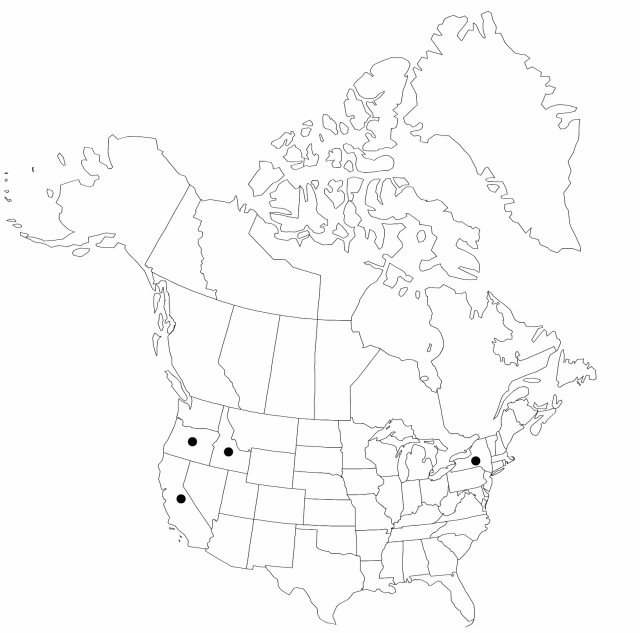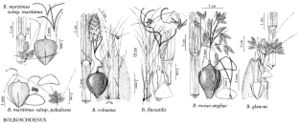Bolboschoenus glaucus
Novon 5: 101. 1995.
Culms to 150 cm × 1.5–3 mm. Leaves: sheaths reaching ± to middle of culm, fronts truncate to convex, membranous at mouth, veins diverging proximal to apex leaving acutely triangular veinless area; widest blade 2–6 mm wide. Inflorescences subumbellate, all or most spikelets solitary or in clusters of 2–7 on 3–11 rays, rays not exceeding 9 cm; involucral-bracts that surpass inflorescence 1–3, widest bract 2–3 mm wide. Spikelets 3–30, ovoid to narrowly lanceoloid or cylindric, 10–40 × 3–5 mm; scales loosely imbricate, orangebrown to stramineous, 5–6 × 2.5 mm, membranous, transparent, apex 2-fid 0.5–1 mm deep, awns slender, 1–2 × 0.25 mm at base. Flowers: perianth bristles mostly tightly attached to shed achene, medium brown, much shorter than to equaling achene; anthers yellow, 3 mm; styles (2–) 3-fid. Achenes pale-brown to blackish brown, cuneate-obovate, clearly to obscurely trigonous or some thickly biconvex, angles rounded, 2.5–3.3 × 1.3–2.3 mm, apex rounded, beak minute, surface glossy, exocarp cells not evident at 20X, in cross-section 1/3 of mesocarp thickness, cells isodiametric; achene specific gravity greater than water. 2n = 110 (Czech Republic).
Phenology: Fruiting summer.
Habitat: Fresh to brackish shores and marshes, rice fields, waste places
Elevation: 10–800 m
Distribution

Introduced; Calif., Idaho, N.Y., Oreg., Eurasia, Africa
Discussion
The earliest known collections of Bolboschoenus glaucus in North America, one a rice-field weed in Colusa County, California, and the other from Long Island, New York, are both dated 1923. The reports (as Scirpus tuberosus Desfontaines) from Quebec and Alabama are based on misidentifications.
Bolboschoenus glaucus was confused with B. maritimus worldwide until recently (J. Browning et al. 1995, 1997; S. G. Smith 1995). The name Scirpus tuberosus Desfontaines (= S. maritimus Linnaeus var. tuberosus (Desfontaines) Roemer & Schultes) was misapplied to B. glaucus by A. H. Beetle (1942) and T. Koyama (1962b). Putative B. glaucus × B. maritimus hybrids are locally common at Lake Lowell near Nampa, Canyon County, Idaho, and in California, where B. glaucus and putative hybrids are common weeds of rice fields and are cultivated with B. maritimus as food for waterfowl (J. Browning et al. 1995). Some specimens of B. maritimus from Long Island, New York, where B. glaucus has also been collected, suggest introgression from B. glaucus.
Selected References
None.
Lower Taxa
"shortened" is not a number.
